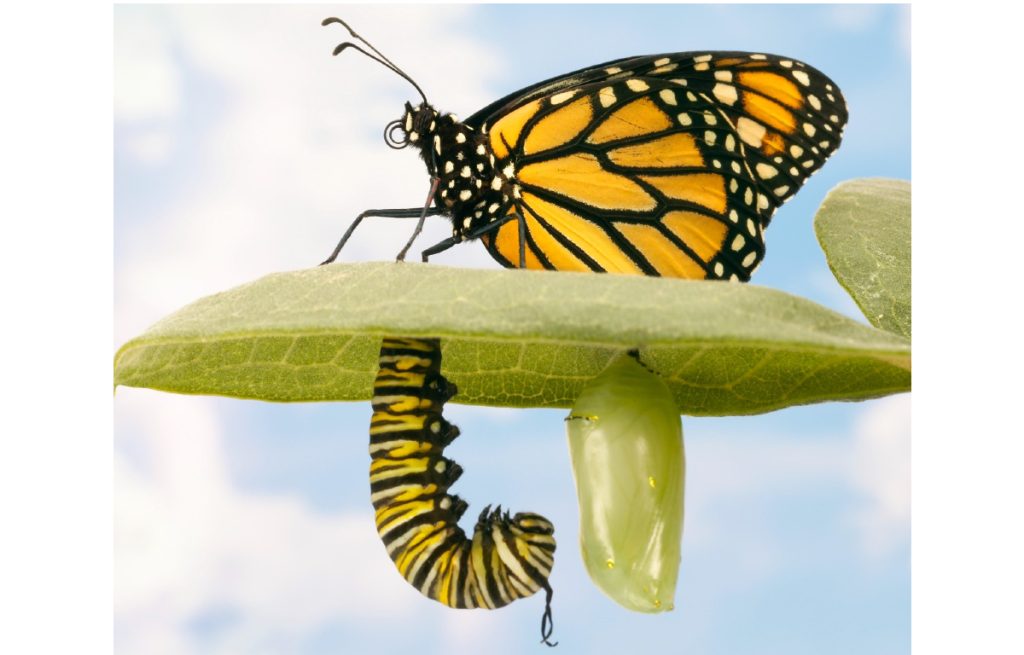
I sometimes wonder if a butterfly ever misses being a caterpillar. It seems ridiculous—why would a butterfly, with its beauty and power of flight, miss its humbler, earthbound stage? And yet, until the moment that it first spread its delicate wings, this fluttering creature had only ever known life as a caterpillar. To achieve its dramatic transformation, I believe, the butterfly had to leave something it valued behind.
As a graduating Ph.D. student, I have had many discussions recently about the transition from Einstein to the “real world.” They often center around the job-hunting process. (I am applying for positions in medical and science communications.) Every conversation is full of hope, apprehension, and excitement; all of them exclude our feelings on leaving the bench behind.
The roles I’m interested in require the scientific knowledge and critical-thinking skills that I developed during my work for my Ph.D. Yet they intentionally do not involve labs, also known as “benchwork.” I have thoroughly enjoyed my time at the bench, but I envision building a new identity as a scientist without some of the frustrations of that life. Like the butterfly, I’m relinquishing being a caterpillar to create this new me. And that’s what has surprised me about the transition: finally leaving benchwork feels bittersweet. I have spent the last eight years complaining about experiments failing inexplicably and unpredictable lab schedules preventing a good work-life balance, and decrying the tedium of performing the same assays repeatedly. How many times have I joked bitterly that my cells only looked good last week because of “lab voodoo,” or that yesterday’s Western blot didn’t work because the moon was in the wrong phase of its cycle? I eagerly looked forward to finally being a scientist without having to “do” the science. And yet here I am, contemplating what I’ll miss about my former life.
Leaving the Lab’s Cocoon
Much of my dissertation work was done using a microscope. From the day I joined my Ph.D. lab, I was thrilled to be able to “see” the science I was studying. With my eye to the lens, I would see an eruption of bright, fluorescent colors. The images I collected would tell a vibrant story about the inner workings of moving cells. Then I would sit for hours and analyze the images until a deeper story emerged about how various proteins interact. Being able to answer your own questions about the biological world is special. There’s something even more exciting about being the first person to push an answer forward. Alongside the thrill of doing novel research, there was a certain rhythm to performing sets of experiments, carrying their own form of familiarity and comfort. The miles I racked up walking back and forth between different labs, the way I had to train my eyes to adjust quickly between the darkness of the microscope room and the brightness of the adjacent computer screen—those moments now contain a newfound romance.
For so long, my notion of what it means to be a scientist has been tied to the science I was physically doing with my hands. That self-identity is going through its own metamorphosis as I prepare to graduate. Here are five of the lessons from being in the lab that I will take with me as I move on to the next stage of my career:
- Redefine perseverance. Success is more than just pushing past obstacles to see my work through to the end. It’s intertwined with distinguishing between opportunities to learn from my mistakes and accepting that sometimes things just fail anyway. (Lab voodoo, anyone?)
- Nurture curiosity. This applies to more than just lofty biological hypotheses. Never settling for “not knowing” means that as I solve the technical problem I’m experiencing, I find the resources I need to finish my task, and I discover what motivates a team member to improve.
- Remind myself that there is a story in every kind of data. I can learn something new about the people and the world around me, from rainbow images of cells to gene sequences across species to what kind of food is most popular at departmental seminars. (For the record, it’s usually pizza.)
- Recognize that I thrive when striking a balance between comfortable rhythm and intermittent excitement. That used to mean repeating experiments seemingly ad infinitum until the much-anticipated “Eureka!” moment. From now on, it might look more like building a routine that includes time for activities that bring me a sense of accomplishment.
- Remember to stand up and walk around. It’s important to use my hands for more than just tapping keys, and to participate in real-world activities. One advantage of benchwork is that it makes exercising mindfulness relatively easy . As my focus narrows to just my laptop screen, stepping away from my computer occasionally will help keep me grounded and involved in my immediate surroundings so I don’t lose myself in the metaverse.
In the few months between my thesis defense and graduation, I have reflected fondly on my years as a lab scientist, and there is a particular sadness to knowing that those days have at last concluded. Nevertheless, I am overjoyed to have put down the pipette for the last time, both literally and figuratively. Being a scientist is multifaceted, and I look forward to spending the next part of my career focusing on new aspects of that identity. Like the emerging butterfly, I am excited for the wide world opening up before me; my proverbial wings are stretching out eagerly. As I prepare to take flight, I like to imagine that the butterfly preparing for its first flight is like me and experiences a flutter of nostalgia for its past life just before takeoff.

